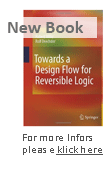






|
About RevKit In recent years, research in the domain of reversible circuit design has attracted significant attention leading to many different approaches e.g. for synthesis, optimization, simulation, verification, and test. However, most of the resulting tools are not publicly available. This often makes the development of new methods harder since e.g. previous approaches are not available for comparison. Furthermore, approaches have to be re-implemented from scratch in order to modify or improve them and the lack of tools for reversible hardware design makes it hard for beginners to get involved in the topic. RevKit tries to address this issue. RevKit is an open source toolkit for reversible circuit designs, which aims to make recent developments in the domain of reversible circuit design accessible to other researchers and interested people. RevKit is a modular and extendable framework which already provides a significant number of approaches and algorithms, but also easily enables the addition of new methods and tools. In this sense, RevKit addresses users who simply want to apply the framework and its tools as well as developers who actively want to develop further methods on top of the framework. Besides basic functionality (like data-structures, parsers, export functions, etc.), so far RevKit include the following approaches: Synthesis
All these tools and algorithms are written in C++ and directly accessible by an API.
That is, they can be used in other C++ programs.
Furthermore, to enable command line usage, all functions are also exposed as a Python library. As a result, RevKit can be applied either from a users' perspective as well as from a developers' perspective.
|